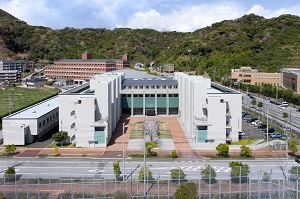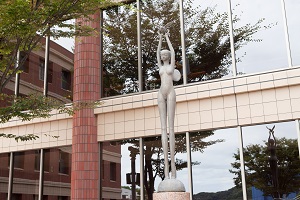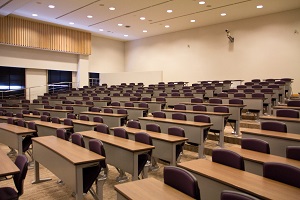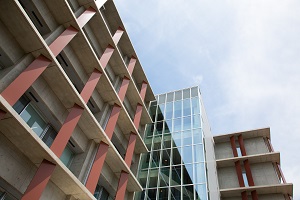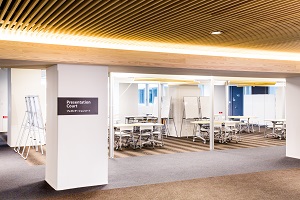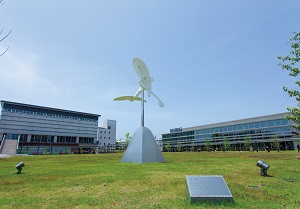| Faculty of Cultural Studies |
In order for the students to achieve the Diploma Policy, the Faculty of Cultural Studies has established General Education courses and Departmental courses.
1. General Education courses
(1) In order for the students to acquire what is needed to function within a society that is fair to all, we have sets of courses through which they learn communication skills (i.e. Literacy courses), foundational knowledge of various areas of study (i.e. Foundational courses) and issues concerning local communities as well as international society (i.e. Theme-based Education courses), knowledge and skills for maintenance and promotion of lifelong health (i.e. Health and Sports courses), and practical initiatives to deal with issues centering around local communities (i.e. University-Community Partnership courses).
(2) English Communication courses are mandatory in years 1 and 2. As for the University-Community Partnership courses, the foundational courses are mandatory; the applied courses are elective. Other courses are chosen based on one’s own interests.
(3) Classes are, as much as possible, kept to small numbers, and methods of Active Learning are employed. Classes run in diverse styles based on the content and specific characteristics of each course. Meticulous evaluation of study is also carried out.
2. Departmental courses
The Departmental courses are composed of Common courses and Specialized courses.
(Curriculum structure and educational content)
(1) The Common Departmental courses are made up of the Literacy courses for the students to gain fundamental skills and communication skills for learning in the department; the Essential courses for them to gain knowledge fundamental to the Department's education; and the Career Development courses for them to improve their employability.
(2) In order for the students to extensively and systematically learn the specialized knowledge of humanities and social sciences, we have three major areas of study: Language and Culture (English Studies, International Culture; Japanese Studies, Japanese Literature), Communal Culture Creation (Communal Culture, Community Planning; Tourism and Culture, Tourism and Town Planning; Current Law in Culture, Life and Law in Culture) and Comprehensive Cultural Studies (to learn the contents of Language and Culture courses and Communal Culture Creation courses from a comprehensive perspective).
(3) In order for the students to learn specialized research methods and deepen specialized knowledge and understanding, we provide special seminars in each area of study. We also provide research seminars to develop the students’ ability to make comprehensive, active use of knowledge, skills, behaviors that they have acquired through department education, to discover various problems within current society actively and autonomously, and to solve them through the collection, appropriate organization and analysis of information.
(4) We also provide teacher-training curricula for Junior and Senior High School (Japanese/English).
(Sequence for course registration)
Common Departmental courses are mostly taken in years 1 and 2. Specialized Departmental courses are mostly taken from years 2 through 4. Specialized Seminars in each area of study, and Research Seminars are taken in years 3 and 4.
(Methods of instruction)
Within the Common Departmental courses and Specialized Departmental courses are a variety of teaching methods to help the students pursue their learning actively. Foundation Seminars in the Common Departmental courses, Specialized Seminars in each area of study, and Research Seminars are conducted in a small, seminar-style classroom. Graduation Research as the culmination of department education is completed through Specialized Seminars.
(Evaluation)
The criteria for completing each course are determined on basis of the Department’s Diploma Policy. The methods and standards of the completion criteria and grade evaluation are made explicit to the students and grade evaluation are based thereon. We also strive to guarantee quality education by evaluating and improving the curriculum in light of the students’ evaluation results.
|
| Faculty of Nursing |
In order for the students to achieve the Diploma Policy, the Faculty of Nursing has established General Education courses and Departmental courses.
1. General Education courses
(1) In order for the students to acquire what is needed to function within a society that is fair to all, we have sets of courses through which students learn communication skills (i.e. Literacy courses), foundational knowledge of various areas of study (i.e. Foundational courses) and issues concerning local communities as well as international society (i.e. Theme-based Education courses), knowledge and skills for maintenance and promotion of lifelong health (i.e. Health and Sports courses), and practical initiatives to deal with regional issues centering around local communities (i.e. University-Community Partnership courses).
(2) English Communication courses are mandatory in years 1 and 2. Among the University-Community Partnership courses, the foundational courses are mandatory; the applied courses are elective. Other courses are chosen based on one’s own interests.
(3) Classes are, as much as possible, kept to small numbers, and methods of Active Learning are employed. Classes are conducted in diverse styles based on the content and special characteristics of each individual course. Meticulous evaluation of study is also carried out.
(4) Through the General Education courses, the students acquire a comprehensive understanding of humans, i.e. the targets of nursing, and they develop abilities to grasp the society in which they live and the issues they face from a global perspective, and to develop affluent humanity and sensitivity.
2. Departmental courses
The Departmental courses are composed of Expertise Foundation courses, Nursing Foundation courses, Clinical Nursing courses, and Comprehensive courses for the students to acquire the necessary specialized knowledge, skills, scientific thinking, problem-solving skills, and international/ interdisciplinary skills, so that they will have a full exercise of their nursing expertise.
(Curriculum structure and educational content)
(1) The Expertise Foundation courses provide the students with specialized knowledge regarding the origins and treatment of humans’ health and illness, and the knowledge to understand people’s health within the continuity of individual, family, and community.
(2) The Nursing Foundation courses are for the students to learn the concept and fundamental knowledge of nursing science, and aim for the students to acquire an understanding of the targets of nursing, ways of viewing and thinking as nursing professionals, and skills in nursing.
(3) The Clinical Nursing courses help the students understand people's diverse ways of living and value systems, with respect and care for the sanctity and rights of human beings by employing scientific thinking and problem-solving skills to come to grips with health problems, to develop skills in advancing nursing towards improving people's healthy lives, the basis of the comprehensive understanding of humans, which lies in the learning though Common Departmental courses, Specialized Departmental courses, and Nursing Foundation courses.
(4) The Comprehensive courses are for the students to cultivate their identity as nursing professionals, to predict health issues in communities, to gain an independent and proactive attitude towards learning, to develop foundational skills in exploring essential aspects of nursing from a research-oriented standpoint in international interdisciplinary perspective.
(Sequence for course registration)
(1) From the early stage that follows their enrollments, the students take Nursing Foundation courses to develop their interest in nursing science and acquire specialized knowledge and skills; they take Expertise Foundation courses to gain knowledge fundamental to the understanding of humans, the targets of nursing. The structure allows for gradual progression throughout the school years from the basic to the application stage and helps the students deepen their specialized knowledge and skills.
(2) With Nursing Foundation courses and Expertise Foundation courses as the basis, our curriculum structure integrates Clinical Nursing courses, through which the students acquire knowledge and skills relating to nursing in each specialized area, and Clinical Internship courses, in which the students put their knowledge into practice so that they can develop nursing for a variety of targets such as individuals and groups as well as for humans’ developmental stage and health level.
(3) To assure that the students will make systematic and practical use of the knowledge and skills they have acquired in classroom environments, we require them to meet prerequisites for Clinical Internships.
(4) Comprehensive courses are taken over the four years to help the students as nursing professionals, to develop their positive attitude towards learning independently and ethical viewpoints. Comprehensive Nursing Practica and Nursing Research are set in year 4, so that the students will be able to integrate the knowledge and skills that they have learned through the Nursing Foundation courses, Expertise Foundation courses, and Clinical Nursing courses, and they will be able to acquire deeper expertise and skills in exploring what nursing is.
(Methods of instruction)
(1) In order for the students to be able to focus on their future and acquire the skills conforming to the Diploma Policy of this department, we provide them with the Department of Nursing Curriculum Structure Chart, the Department of Nursing Course Registration Model (General Education courses), the Department of Nursing Course Registration Model (Hospital) Nurse), the Department of Nursing Course Registration Model (Public Health Nurse), the Department of Nursing Course Registration Model (Midwife), the Department of Nursing Course Registration Model (School Nurse), and instructions on how to register for courses.
(2) In order for the students to be able to acquire skills conforming to the Diploma Policy of this department, we use a variety of methods of instruction. By employing pre-assignments, post-assignments, group work, group discussions, and active learning methods, we assist them to develop their abilities to learn independently. In order for the students to improve their abilities to integrate their knowledge and skills to put them in practical use for analysis, decision-making, and consider and exercise appropriate care, classes are conducted in small numbers and in a simulation format. In order to develop their abilities to produce scientific logical thinking and new knowledge in nursing science, the students engaged in their nursing research activities in groups. We also strive to provide educational environments for helping them independently advance their learning.
(Evaluation)
For each lecture, seminar, and practicum, completion criteria and grade assessments are employed in accordance with the Diploma Policy. The methods/criteria of class completion and grade assessment are made accessible to the students by means of syllabi and lists of requirements on practica. Evaluations for graduation are made following the Diploma Policy. We also strive to guarantee quality education by evaluating and improving the curriculum in light of the students’ evaluation results.
|
| Faculty of Social Welfare |
In order for the students to fulfil the Diploma Policy, the Faculty of Social Welfare has established General Education and Departmental courses.
1. General Education courses
(1) In order for the students to acquire what is needed to function within a society that is fair to all, we have sets of courses through which students learn communication skills (i.e. Literacy courses), foundational knowledge of various areas of study (i.e. Foundational courses) and issues concerning local communities as well as international society (i.e. Theme-based Education courses), knowledge and skills for maintenance and promotion of lifelong health (i.e. Health and Sports courses), and practical initiatives to deal with regional issues centering around local communities (i.e. University-Community Partnership courses).
(2) English Communication courses are mandatory in years 1 and 2. Among the University-Community Partnership courses, the foundational courses are mandatory; the applied courses are elective. Other courses are chosen based on one’s own interests.
(3) Classes are, as much as possible, kept to small numbers, and methods of Active Learning are employed. Classes are conducted in diverse styles based on the content and special characteristics of each individual course. Meticulous evaluation of study is also carried out.
2. Departmental courses
(Curriculum structure and educational content)
11 sets of Departmental Expertise courses are provided on the basis of consultation assistance to help the students acquire the specialized as well as practical knowledge and skills in social welfare studies - those are underpinned by values of human rights and social justice, which are also related to the fields of nursing welfare and psychiatric welfare. The courses forming each of the 11 sets are ordered sequentially in terms of developmental stages from the foundational stage to the stage of practical application. The sets for the foundational stage include Fundamentals in Social Welfare Studies, Social Welfare System, and Understanding the Mind and Body. The sets for the foundational and intermediate stages include Fundamentals of Consultation Assistance and Understanding Nursing Care Public Welfare. The sets for the application stage include Communal and International Social Welfare and Rehabilitation Assistance. The sets for the practical and advanced stages include Consultation Assistance Practica, Nursing Care Public Welfare Practica, Mental Health Welfare Practica, and Comprehensive Studies.
(Sequence for course registration)
Courses in the foundational stage, the application stage, and the practical and advanced stage are taken mainly in years 1 and 2, in years 2 and 3, and in years 3 and 4, respectively. We consider the eligibility for national examinations for Social Worker to be the fundamental qualification that proves that the student has mastered the knowledge and skills required to function in the realms of social welfare. In addition, courses are available for eligibility requirements for national examinations for qualifications as professionals in Nursing Care Public Welfare/Mental Health Welfare.
(Methods of instruction)
Each course, emphasizing Active Learning as an instructional method, is designed to develop by introducing pre-class assignments, post-class assignments, group discussions, reaction papers, etc. We make active use of small-size seminar-type and/or hands-on practical training type of classes especially in courses placed at the practical and advanced stage. This is intended to help the students establish and deepen the knowledge and skills they have learned in the foundational stage, and to acquire comprehensive knowledge and skills required of social welfare professionals and to develop an ability to explore the study of social welfare.
(Evaluation)
Specific goals are set for each course in line with the Department’s educational philosophy and objectives. These goals, together with criteria and methods of grading and evaluating, are made accessible to the students.
Multifaceted methods of evaluation are employed in accordance with the nature of each stage and each course. Grade evaluation for determining whether the student has acquired the capabilities required of a professional in the field of social work, is conducted in accordance with the evaluation indexes and criteria laid out for each course. We also strive to guarantee quality education by evaluating and improving the curriculum in light of the students’ evaluation results.
|
| Faculty of Nutrition |
In order for the students to achieve the Diploma Policy, the Faculty of Nutrition has established General Education and Departmental courses.
1. General Education courses
(1) In order for the students to acquire what is needed to function within a society that is fair to all, we have sets of courses through which students learn communication skills (i.e. Literacy courses), foundational knowledge of various areas of study (i.e. Foundational courses) and issues concerning local communities as well as international society (i.e. Theme-based Education courses), knowledge and skills for maintenance and promotion of lifelong health (i.e. Health and Sports courses), and practical initiatives to deal with regional issues centering around local communities (i.e. University-Community Partnership courses).
(2) English Communication courses are mandatory in years 1 and 2. Among the University-Community Partnership courses, the foundational courses are mandatory; the applied courses are elective. Other courses are chosen based on one’s own interests.
(3) Classes are, as much as possible, kept to small numbers, and methods of Active Learning are employed. Classes are conducted in diverse styles based on the content and special characteristics of each individual course. Meticulous evaluation of study is also carried out.
2. Departmental courses
In order to help the students develop into internationally and socially minded nutritionists, we have three sets of courses: Foundational, Specialist Field Basics, and Specialist Field. The courses in these sets are arranged sequentially from the basic stage, to the practical stage, to the advanced stage.
(Curriculum structure and educational content)
(1) The Foundational courses are set as complements to the other Departmental courses in order to help the students make progress on the necessary background knowledge and fundamental academic skills.
(2) Specialist Field Basics courses are for the students to secure the foundation they need to acquire knowledge and skills in their areas of specialization. The Specialist Field Basics are composed of three subsets in terms of educational content: Society, Environment and Health; Structure and Functions of the Human Body and Origins of Diseases; and Food and Health. The courses of Structure and Functions of the Human Body and Origins of Diseases, and the course of Food and Health are designed to deepen the students' understanding of humans and living; and the course of Society, Environment and Health provides the students with knowledge on society and environment, as well as health and dietary life.
(3) Experiments and practica are placed in the course of the Specialist Field Basics, with the aims to deepen the understanding of various educational contents and gain skills needed.
(4) The Specialist Field courses are for the students to deepen their expertise as nutritionists or nutrition teachers in various areas of profession. The Specialist Field is divided into six main courses in terms of educational content: Basic Nutrition Studies, Applied Nutrition Studies, Nutrition Education, Clinical Nutrition Studies, Public Nutrition Studies, and Food Service and System Management, as well as Comprehensive Seminars designed to develop the students’ comprehensive skills to all-around abilities to conduct nutritional assessments and nutritional management across the set of courses.
(5) Among the Specialist Field courses are Experiments and Practica with the aim of providing the students with the skills required of national registered dietitians.
(6) The Specialist Field courses, in tandem with Practical Trainings, are for the students to identify issues while working on their practical activities, as well as acquire skills in communication and presentation as a result of solving those issues. We strive to unify specialized knowledge and skills in conducting the required appropriate management, drawing on nutritional assessment and judgement.
(7) We also provide Industrial Internship for the students to gain work experience at companies, public organizations, etc., and Graduation Research for them to acquire skills to solve issues by experiencing the series of research processes.
(Sequence for course registration)
(1) Foundational courses are taken in year 1.
(2) Among the Specialist Field Basics are the course of the Structure and Functions of the Human Body and Origins of Diseases, and the course of Food and Health, both of which are taken mainly in years 1 and 2. The course of Society, Environment and Health is taken mainly in year 3.
(3) Courses in the Specialist Field are taken mainly in years 2 and 3.
(4) Practical trainings in the Specialist Field are taken in year 3.
(5) Industrial Internship and Graduation Research are taken in year 4.
(Methods of instruction)
(1) The students are provided with guidance regarding course registration through the Faculty of Nutrition Curriculum Structure Chart and Course Registration Model and the Faculty of Nutrition Course Registration Model (for a nutrition teacher), which describe the way the Departmental courses and the mandatory courses as well as recommended elective courses in General Education are organized.
(2) All the Departmental courses, except for Experiments and Practica, require the students to complete pre-practicum and post-practicum assignments as well as group work and seminars so that they will make proactive use of learning strategies.
(Evaluation)
For each course, specific goals are set of which the students are reminded, including information on the criteria and methods employed. We strive to guarantee the quality of education by evaluating and improving the curriculum in light of two types of student evaluation questionnaire: Class Evaluation Questionnaire and Nutritionist Technical Skills Attainment Level Questionnaire, the latter of which is a self-evaluation questionnaire and is conducted immediately before graduation.
|

